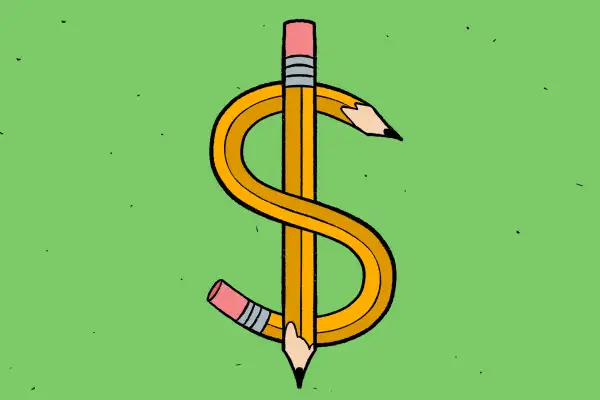What Is Student Loan Refinancing?

Student loan refinancing is taking out a private student loan to repay an existing student loan (private or federal).
Most people refinance their student loans to consolidate multiple loans into a single debt, snatch up a lower interest rate, or lower monthly payments.
What You Should Know:
- Unlike mortgage refinancing, student loan refinancing is usually free — many private student lenders don’t charge additional costs, like application or origination fees.
- Refinancing a private loan involves swapping an old loan for a new one with new terms.
- Refinancing a federal student loan, on the other hand, means giving up important benefits like deferment, forbearance, and income-based repayment plans. Explore these alternatives before refinancing a federal student loan with a private lender.
Why Refinance?
Refinancing a student loan is as important a financial decision as when you took out the original loan. It’s not something you should rush into, but there are many good reasons to refinance.
Get a Lower Interest Rate
If your financial situation has improved considerably since you took out the original loan or if average interest rates are lower now than they were back then, it’s likely you could get a lower interest percentage if you refinance.
If the difference between the rates is big, it could mean huge savings to you over the years. For example, you would save about $7,000 in interest over 15 years on a $50,000 loan if the interest rate went down from 6.5% to 5.0%.
Get a Longer Loan Term
Another reason to refinance a student loan is to change the amount of time you have to pay the loan. Getting a longer loan term could lower your minimum monthly payment and reduce your overall debt burden.
This could be useful, for example, if you’re looking to buy a house and want to reduce your debt-to-income ratio. But note that if you take a longer time to pay off the debt, you’ll end up paying more interest in the long run.
Remove a Co-signer
Many students take out student loans with a parent or guardian as a co-signer because they are minors or just don’t have enough credit or income to get approved on their own.
Years later, you might seek to remove the co-signer from your loan for many reasons: to be solely responsible for your finances, take the potential weight of paying off your loan from your co-signer’s shoulders, or improve your co-signer’s DTI ratio by removing the open loan from their credit report.
If your credit score is now better than your co-signer’s was back then, you might have the added bonus of nabbing a lower interest rate as well.
Consolidate Multiple Loans Under a Single Lender
If you have multiple loans from multiple institutions and you’re having a hard time keeping track of all your payments or just want to streamline your bills, refinancing multiple loans under a single financial institution could make sense for you.
By taking out a single loan for the total amount of all your existing loans and paying those smaller loans off, you can consolidate your student loan debt.
Refinancing Federal Loans Is (Often) A Bad Idea
Keep in mind that the information above only applies to private student loans. There are many great reasons to refinance private student loans, but there are fewer good reasons to refinance a federal student loan.
Unlike private student loans, which are issued by private banks and other financial institutions, federal student loans are backed by the federal government and come with a wide range of protections and benefits that are not available for private student loans.
You can find a full overview of federal student loan benefits on the Federal Student Aid website.
The federal government doesn’t issue refinancing loans; instead, they provide alternatives like loan forgiveness programs, loan deferment and forbearance, public service loan forgiveness, and Direct Consolidation Loans for borrowers who need debt relief.
If you wanted to refinance a federal student loan, you would need to take out a private student loan. That means you would lose the favorable terms and conditions of a federal student loan forever.
This is not to say that it’s always a bad idea. Like we showed above, getting a lower interest rate could mean thousands of dollars in savings over the years.
“If your finances are on solid footing and you work in a field that's not eligible for federal loan forgiveness, refinancing could be worth [losing the benefits],” says Andrew Pentis of StudentLoanHero.com.
How to Qualify for Refinancing
Just as they do for mortgages or personal loans, all student loan lenders have their own underwriting criteria and eligibility requirements.
These are simply some of the most common conditions you’ll have to meet to qualify for student loan refinancing.
Good credit score
Most lenders have a minimum score of 650, but some can demand scores as high as 700.
To qualify for the lowest rates, aim to get your credit score above the 650 mark. If your score is too low, getting a co-signer with good credit could help your application.
Minimum income
This requirement varies a lot. Some lenders don’t have a minimum. Others can ask for $25,000 or as much as $70,000.
But most lenders will ask that you have a stable source of income. Not having one could mean an increased interest rate.
US citizenship or permanent residency
If you’re not a U.S. citizen or permanent resident, you’ll need a co-signer who is.
The lender will ask for documents such as a birth certificate, passport, or green card. You will also need to provide your social security number.
May require a degree
Many lenders will ask for a bachelor’s degree at a minimum. You may not be able to refinance until after graduation.
However, there are lenders out there who do refinance loans for people who didn't graduate, especially if you meet all other requirements.
History of on-time payment
Most lenders will want to see that you’ve been paying your loans on time for at least a year or two.
To check your payment history, request a free credit report from one of the three major credit reporting agencies.
FAQs About Student Loan Refinancing
What's the difference between student loan refinancing and student loan consolidation?
Student loan consolidation applies to federal loans only. It entails combining all of your federal student loans into a single loan with a new rate.
The interest rate on your new loan will be the weighted average of the rates on the loans you are consolidating.
People often choose to consolidate their federal student loans to switch from a variable interest rate to a fixed interest rate or to change the loan's repayment term.
Student loan refinancing, on the other hand, entails replacing your existing loans — whether federal or private — with a private loan featuring a new rate and term.
Like consolidation, refinancing can help you consolidate payments, change from a variable interest rate to a fixed interest rate, and extend or shorten your loan term to adjust your loan repayment amount.
While there are several benefits to refinancing, if you have federal student loans, refinancing your loans to a new private loan will mean losing federal student loan protections like income-based repayment, deferment, and forbearance.
Consider your options carefully before opting to refinance.
When should you refinance your student loans?
There is no single answer to the question of when to refinance. In general, there are some instances in which you may want to consider refinancing:
- You only have private student loans
- Interest rates are lower now than when you took out your loan(s) and could save a considerable amount of money by refinancing to a lower rate
- If you're not close to paying off your student loan(s)
- If your credit income as increased considerably since then taking out your loan(s)
- You have variable-rate loans and want to switch to a fixed-rate loan
Does refinancing student loans hurt your credit?
Refinancing your student loans could affect your credit, but that will depend on how you shop around for interest rates.
Comparing multiple quotes from different lenders entails soft credit inquiries that should not affect your credit score.
If you go through with a full application with a lender, then there will be a hard credit inquiry that can lower your credit score by a few points.
If you performed full applications with several different lenders over a period that exceeds 30 days, then your FICO credit score might take a bigger hit.
How can I get a lower interest rate on my student loans?
You could obtain a lower rate in your private or federal student loans by refinancing. Nevertheless, if you only have federal student loans, consider consolidation before you think about refinancing.
If you've decided to refinance your private student loans, the best way of getting a lower interest rate on your new loan is to demonstrate your creditworthiness through a high credit score. The better your credit, the lower the interest rate you may qualify for.
If you have a low credit score or insufficient credit history, consider applying with a cosigner.
Finally, if you're able to, sign up for automatic payments. Some lenders offer interest rate reductions to those who enroll in auto-pay.
What is a student loan servicer?
Loan servicers are entities that collect loan payments, provide customer service and support, and handle other administrative tasks on behalf of loan lenders. Loan servicers also track loans while borrowers are in school, adjust repayments plans, and process requests for deferment and forbearance.
